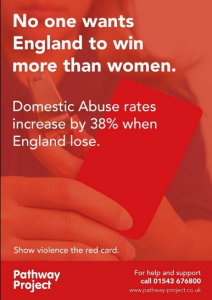“He’s coming home. He’s coming home. He’s coming………and it is not going to be nice.”

Risk of domestic violence as England plays on and women fear it all kicking off…
All the excitement, surprise and adulation of England’s football success can mask the fear that such events spark a rise in domestic violence. According to Women’s Aid, research has shown that when England men’s football team play there can be an increase in domestic abuse incidents of up to 26% before and after the game. This figure rises to an alarming 36% if England lose.
It is therefore important to look out for the potential effects of domestic abuse while also recognising the amazing success of England footballers reaching their first semi-final world cup success in, well, three years in the case of the England Women’s team, losing 2-1 to Japan in 2015 and 28 years since England’s men last reached the semi-finals in Turin at Italia ‘90.
The above domestic abuse statistics come from research undertaken by Women’s Aid. Their campaign, Football United Against Domestic Violence links football clubs, the FA, the premier league and BT Sport to stand together against domestic abuse and sexist attitudes. Women’s Aid’s chief executive Katie Ghose says “Categorically, football does not cause domestic abuse, the behaviour and actions of abusers who exert power and control over their victims cause domestic abuse. However, domestic abuse does not happen in a cultural vacuum. There is a clear link between the “everyday sexism” women put up with on a daily basis and the sexual harassment, assault and domestic abuse that women overwhelmingly experience”.
Katie Ghose goes on to say “Football is part of our national culture, enjoyed by millions of men, women and children every week. The world cup is a time when supporters from all clubs come together in support of their national team”.
The PFA, the Professional Footballers Association has worked hard to combat domestic abuse and is a keen and active supporter of the White Ribbon campaign, where men stand up against violence against women.
There is a powerful article by Heller Pryce in this month’s ELLE magazine. (link 6 July 2018). Here we find out about ‘Lucy’s’ tale and harrowing fear that exists in anticipation of the drunken football fan coming home after an England game.
As Katie Ghose says above, football does not cause domestic abuse but the link with drinking and betting is a strong one and these are known causational factors. A campaign by a research team from Lancaster University in 2013 analysed domestic violence figures from the 2002, 2006, 2010 and 2014 World Cups. Domestic violence incidents were 11% higher the day after England played, whatever the outcome. Domestic abuse does not just happen during the World Cup. Domestic abuse is on the increase. Be aware.
Help when faced with domestic abuse
Help can be found in an emergency by simply calling the police who are best placed to deal with violent incidents but also the national domestic violence helpline run by Women’s Aid and Refuge (telephone number 0808 2000 247 or www.womensaid.org.uk)


No comments